
Fascism is a far-right, authoritarian, ultranationalist political ideology and movement, characterized by a dictatorial leader, centralized autocracy, militarism, forcible suppression of opposition, belief in a natural social hierarchy, subordination of individual interests for the perceived good of the nation or race, and strong regimentation of society and the economy.
Neo-fascism is a post–World War II far-right ideology that includes significant elements of fascism. Neo-fascism usually includes ultranationalism, racial supremacy, populism, authoritarianism, nativism, xenophobia, and anti-immigration sentiment, as well as opposition to liberal democracy, social democracy, parliamentarianism, liberalism, Marxism, capitalism, communism, and socialism. As with classical fascism, it proposes a Third Position as an alternative to market capitalism.

Corriere della Sera is an Italian daily newspaper published in Milan with an average circulation of 246,278 copies in May 2023. First published on 5 March 1876, Corriere della Sera is one of Italy's oldest newspapers and is Italy's most read newspaper. Its masthead has remained unchanged since its first edition in 1876. It reached a circulation of over 1 million under editor and co-owner Luigi Albertini between 1900 and 1925. He was a strong opponent of socialism, clericalism, and Giovanni Giolitti, who was willing to compromise with those forces during his time as prime minister of Italy. Albertini's opposition to the Italian fascist regime forced the other co-owners to oust him in 1925.
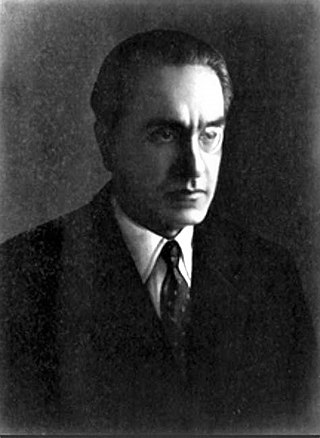
Giulio Cesare Andrea "Julius" Evola was an Italian far-right philosopher. Evola regarded his values as aristocratic, monarchist, masculine, traditionalist, heroic, and defiantly reactionary. An eccentric thinker in Fascist Italy, he also had ties to Nazi Germany; in the post-war era, he was an ideological mentor of the Italian neo-fascist and militant Right.

The March on Rome was an organized mass demonstration and a coup d'état in October 1922 which resulted in Benito Mussolini's National Fascist Party ascending to power in the Kingdom of Italy. In late October 1922, Fascist Party leaders planned an insurrection to take place by marching on the capital. On 28 October, the fascist demonstrators and Blackshirt paramilitaries approached Rome; Prime Minister Luigi Facta wished to declare a state of siege, but this was overruled by King Victor Emmanuel III, who, fearing bloodshed, persuaded Facta to resign by threatening to abdicate. On 30 October 1922, the King appointed Mussolini as Prime Minister, thereby transferring political power to the fascists without armed conflict. On 31 October the fascist Blackshirts paraded in Rome, while Mussolini formed his coalition government.
Fascio is an Italian word literally meaning "a bundle" or "a sheaf", and figuratively "league", and which was used in the late 19th century to refer to political groups of many different orientations. A number of nationalist fasci later evolved into the 20th century Fasci movement, which became known as fascism.
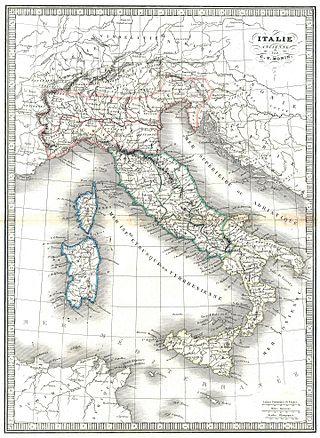
This article covers the history of Italy as a monarchy and in the World Wars. The Kingdom of Italy was a state that existed from 17 March 1861, when Victor Emmanuel II of Sardinia was proclaimed King of Italy, until 2 June 1946, when civil discontent led to an institutional referendum to abandon the monarchy and form the modern Italian Republic. The state resulted from a decades-long process, the Risorgimento, of consolidating the different states of the Italian Peninsula into a single state. That process was influenced by the Savoy-led Kingdom of Sardinia, which can be considered Italy's legal predecessor state.
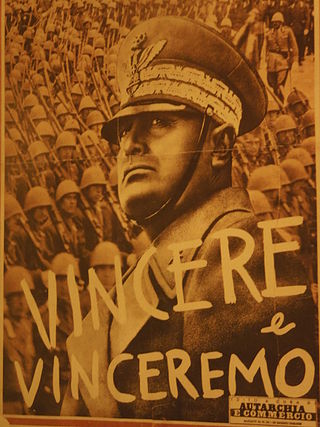
The history of fascist ideology is long and it draws on many sources. Fascists took inspiration from sources as ancient as the Spartans for their focus on racial purity and their emphasis on rule by an elite minority. Fascism has also been connected to the ideals of Plato, though there are key differences between the two. Fascism styled itself as the ideological successor to Rome, particularly the Roman Empire. From the same era, Georg Wilhelm Friedrich Hegel's view on the absolute authority of the state also strongly influenced fascist thinking. The French Revolution was a major influence insofar as the Nazis saw themselves as fighting back against many of the ideas which it brought to prominence, especially liberalism, liberal democracy and racial equality, whereas on the other hand, fascism drew heavily on the revolutionary ideal of nationalism. The prejudice of a "high and noble" Aryan culture as opposed to a "parasitic" Semitic culture was core to Nazi racial views, while other early forms of fascism concerned themselves with non-racialized conceptions of the nation.

The "Manifesto of Race", otherwise referred to as the Charter of Race or the Racial Manifesto, was a manifesto which was promulgated by the government of Benito Mussolini on 14 July 1938, its promulgation was followed by the enactment, in October 1938, of the Racial Laws in Fascist Italy and the Italian Empire.

Italian fascism, also classical fascism and Fascism, is the original fascist ideology, which Giovanni Gentile and Benito Mussolini developed in Italy. The ideology of Italian Fascism is associated with a series of political parties led by Mussolini: the National Fascist Party (PNF), which governed the Kingdom of Italy from 1922 until 1943, and the Republican Fascist Party (PFR), which governed the Italian Social Republic from 1943 to 1945. Italian fascism also is associated with the post–war Italian Social Movement (MSI) and later Italian neo-fascist political organisations.

The Kingdom of Italy was a state that existed from 17 March 1861, when Victor Emmanuel II of Sardinia was proclaimed King of Italy, until 12 June 1946, when the monarchy was abolished, following civil discontent that led to an institutional referendum on 2 June 1946, which resulted in a modern Italian Republic. The kingdom was established through the unification of several states over a decades-long process, called the Risorgimento. That process was influenced by the Savoy-led Kingdom of Sardinia, which can be considered Italy's legal predecessor state.
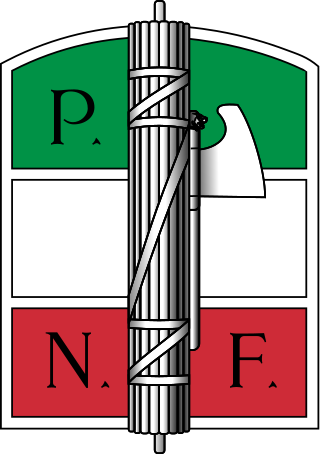
The National Fascist Party was a political party in Italy, created by Benito Mussolini as the political expression of Italian fascism and as a reorganisation of the previous Italian Fasces of Combat. The party ruled the Kingdom of Italy from 1922 when Fascists took power with the March on Rome until the fall of the Fascist regime in 1943, when Mussolini was deposed by the Grand Council of Fascism. It was succeeded, in the territories under the control of the Italian Social Republic, by the Republican Fascist Party, ultimately dissolved at the end of World War II.

Benito Amilcare Andrea Mussolini was an Italian dictator who founded and led the National Fascist Party (PNF). He was Prime Minister of Italy from the March on Rome in 1922 until his deposition in 1943, as well as Duce of Italian fascism from the establishment of the Italian Fasces of Combat in 1919 until his summary execution in 1945 by Italian partisans. As dictator of Italy and principal founder of fascism, Mussolini inspired and supported the international spread of fascist movements during the inter-war period.

The Italian racial laws, otherwise referred to as the Racial Laws, were a series of laws which were promulgated by the government of Benito Mussolini in Fascist Italy from 1938 to 1944 in order to enforce racial discrimination and segregation in the Kingdom of Italy. The main victims of the Racial Laws were Italian Jews and the native African inhabitants of the Italian Empire. In the aftermath of Mussolini's fall from power and the invasion of Italy by Germany, the Badoglio government suppressed the laws in January 1944. They remained enforced and were made more severe in the territories ruled by the Italian Social Republic until the end of the Second World War.

Renato Ricci was an Italian fascist politician active during the Mussolini government.

The Academia della Farnesina, also known as the Accademia fascista maschile di educazione fisica or Accademia fascista della Farnesina, was a centre for sport and political education in Fascist Italy.
Proto-fascism refers to the direct predecessor ideologies and cultural movements that influenced and formed the basis of fascism. A prominent proto-fascist figure is Gabriele D'Annunzio, the Italian nationalist whose politics influenced Benito Mussolini and Italian Fascism. Proto-fascist political movements include the Italian Nationalist Association, the German National Association of Commercial Employees and the German National People's Party.
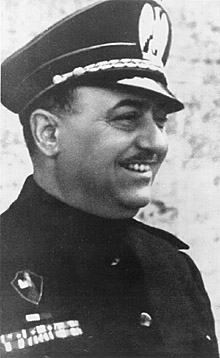
Manlio Morgagni was an Italian Fascist, journalist, former mayor of Milan, former member of the Senate of Italy, and director of the prominent news agency Agenzia Stefani during a period when it was closely aligned with the Fascist regime of Benito Mussolini.

Anti-fascism is a political movement in opposition to fascist ideologies, groups and individuals. Beginning in European countries in the 1920s, it was at its most significant shortly before and during World War II, where the Axis powers were opposed by many countries forming the Allies of World War II and dozens of resistance movements worldwide. Anti-fascism has been an element of movements across the political spectrum and holding many different political positions such as anarchism, communism, pacifism, republicanism, social democracy, socialism and syndicalism as well as centrist, conservative, liberal and nationalist viewpoints.

The Kingdom of Italy was governed by the National Fascist Party from 1922 to 1943 with Benito Mussolini as prime minister and dictator. The Italian Fascists imposed totalitarian rule and crushed political opposition, while promoting economic modernization, traditional social values and a rapprochement with the Roman Catholic Church.













